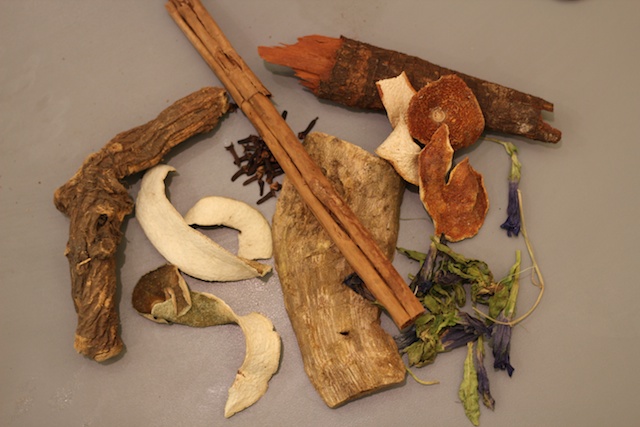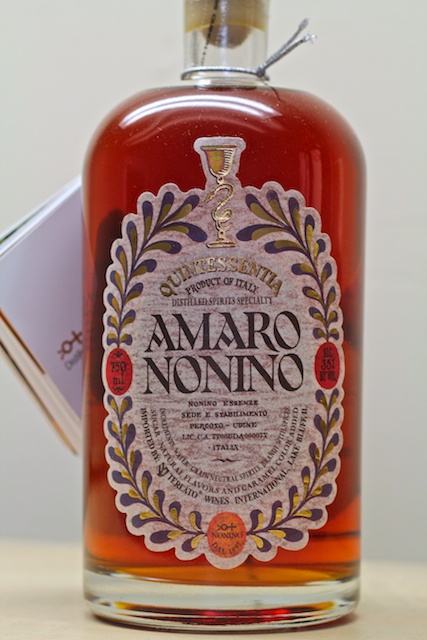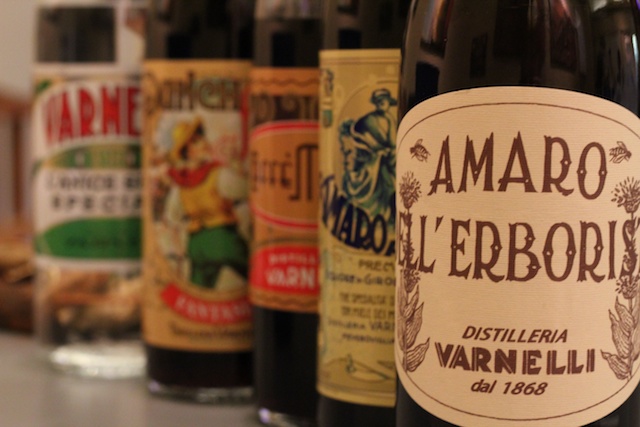That's Amaro

“Amaro” means bitter in Italian and it’s the word used to describe a category of spirits that uses bitter roots, flowers, or barks in conjunction with sugar and a base alcohol (usually grain spirit, but sometimes wine or brandy) to create a flavored liqueur. The recent renaissance of amari like Campari has created a bitter resurrgence in the cocktail world, with bartenders raising the bar far beyond simple staples like a Negroni or a Black Manhattan. Whereas Campari, Cynar, and newer products like Gran Classico are meant specifically for cocktails (I think you'd be reaching for the toothpaste if you drank Campari straight up), traditional amari are meant for sipping after dinner; they're digestivos made with medicinal herbs to help ease your stomach after a big meal.
For more than one hundred years, different areas of Italy have been producing regional versions of amari; typically from herbs, roots, and botanicals found in that particular locale. Just like Tuscany is known for Sangiovese, and Piedmonte is famed for its Nebbiolo, each region of Italy has its own special recipe (usually heavily-guarded and top secret) for an amaro. I've personally been cutting back on my brown booze consumption as of late, instead opting for a shot of Nonino or Montenegro before bedtime. Let's take a look at our current selection that continues to grow as more and more Italian amari are imported:
Liguria – Amaro Di S. Maria al Monte $36.99 – First created by the monks of the Santa Maria monastery near Florence, the recipe was sold to a Mr. Vignale in 1911, who began producing it for the Liguarian region. The ingredients are 100% natural with absolutely no artificial flavors or colors: Chinese rhubarb, China root, gentian root, orange peel, angelica, juniper, muscat nut, saffron, plus many more herbs are used to create the flavor profile.
Bologna – Amaro Montenegro $26.99 – First produced in 1885 by Bolognan citizen Stanislao Cobianchi, who traveled through the Principality of Montenegro he was struck by the extraordinary digestive powers of a local drink known as Karik. Returning to Italy, Stanislao cloistered himself away in a liquoreria of the Piemont where, after learning the secrets of distillation, he was able to reproduce the flavors of the drink once tasted in Montenegro. Returning to Bologna as an accomplished master of his trade, Stanislao opened a small liquor store and subsequently a distillery in order to produce and market his Amaro Montenegro, made with over 40 different herbs.

Friuli – Nonino Quintessentia Amaro $44.99 – From Distillatori Nonino in Italy's Friuli. This amaro is a grape distillate (brandy) infused with herbs and aged in barrique, which creates a more delicate and round amaro due to the higher quality base. It's also barrel-aged, adding extra richness.
Sicily – Averna Amaro Siciliano $29.99 – Produced in Caltanissetta, Sicily, Averna is named after its inventor, Salvatore Averna, who invented the recipe in 1868. Herbs, roots and citrus rinds are allowed to soak in the base liquor before caramel is added.
Lombardia – Lazzaroni Amaro $25.99 – Located in the town or Sarrono, in the Lombardian province of Varese, Lazzaroni has been producing traditional aperitivos, digestivos, and extracts based on guarded family recipes since 1851. Made from a special selection of herbs, plants, roots, and berries from the Alps.

Lombardia – Braulio Amaro Alpino $34.99 – Created in Bormio in 1875 by Francesco Peloni, a pharmacist who specialized in the field of medicinal aromatic herbs, Braulio is made with thirteen fresh herbs sourced from the Valtellina mountain region, including gentian, juniper, peppermint, star anise, wormwood, bitter orange and yarrow. After being infused with alcohol, it is then matured in Slavonian oak for two years, fully integrating the flavors and lending additional complexity.
Piedmonte – Cardamaro Amaro $18.99 – This secret family recipe was developed over the last century by the Bosca family using a wine base of Moscato, making it more like a vermouth. Cardoon, blessed thistle and several other botanicals are infused into the base with a bit of sugar added.
Basilicata – Lucano Amaro $24.99 – This traditional Amaro from the far flung Basilicata region is made in the most traditional manner. Using only natural botanicals and following a hundred year old family recipe, the secret ingredient that differentiates Lucano is a closely guarded family secret, but the recipe includes Roman absinthe, wormwood, Clary sage, musk yarrow, holy thistle, sweet orange, gentian, and aloe.
Milan – Fernet Branca $21.99 – Fernet Branca is an Italian amaro developed in 1845. The family's secret recipe still has never been disclosed, but what they can tell you is that it is a combination of 27 different herbs picked in four continents and aged for more than a year in oak casks. Fernet is also a specific type of amaro, now considered an entirely different subgroup of more minty, medicinal-flavored liqueurs.

Marche – Varnelli Amaro Sibilla $51.99 – From Italy's Varnelli family, a producer from the Marche region that has been distilling since 1868. It was created in 1868 by the herbalist Girolamo Varnelli. According to his recipe, the ingredients are an infusion of herbs and roots from Monti Sibillini made on wood fire, pure honey from Monti Sibillini, and alcohol. These ingredients, once blended, have to be decanted and aged for several months.
Varnelli Amaro Dell'Erborista $61.99 – Rhubarb, dried orange peel, cloves, gentian root, and more are used to take the Sibilla to a new level of bitterness. This is a cloudy and unfiltered spirit that is quite supple, but bitter as bitter can be on the finish.
And this is just a brief overview! There are about ten more I didn't list and there are five more samples sitting on my desk for approval. I can't get enough of this stuff. Every family with its own secret recipe, all the herbs and medicinal properties, and the variety of flavor.....I love it.
-David Driscoll
